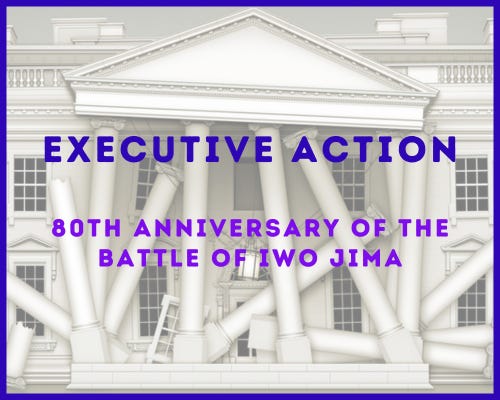Overview:
This presidential proclamation commemorates the 80th anniversary of the Battle of Iwo Jima, one of the most pivotal battles in the Pacific Theater during World War II. The proclamation honors the bravery and sacrifice of U.S. Marines and Sailors who fought on the island, highlighting the famous flag-raising on Mount Suribachi as an enduring symbol of American resilience. It also reflects on the transformation of the U.S.-Japan relationship from wartime adversaries to strong allies, emphasizing the lasting peace and prosperity that emerged from this history. While the proclamation appropriately honors the fallen, progressives emphasize the importance of using such anniversaries to advocate for peace, acknowledge the full historical context of war, and reinforce international cooperation.
Detailed Analysis:
Recognizing Military Sacrifice While Advocating for Peace:
Policy: The proclamation pays tribute to the courage and endurance of American service members who fought in the Battle of Iwo Jima.
Progressive Concern:
Balancing Military Valor with Anti-War Messaging: While honoring those who served is crucial, it is equally important to use historical anniversaries to promote peace and emphasize diplomatic solutions to conflict.
Acknowledging the Full Scope of War’s Impact: The commemoration should also recognize the devastating loss of life on all sides, including the Japanese soldiers and civilians caught in the war.
Preventing the Glorification of War: Celebrating military triumphs without a strong emphasis on the costs of war risks promoting a culture of militarism rather than a commitment to global peace.
Historical Context and Reflection on U.S.-Japan Relations:
Policy: The proclamation underscores the transformation of the U.S.-Japan relationship from wartime enemies to one of the strongest alliances in modern international relations.
Progressive Concern:
Learning from History: The evolution of U.S.-Japan relations demonstrates the power of diplomacy and reconciliation, yet the proclamation should further emphasize the role of post-war peacebuilding efforts and economic cooperation.
Avoiding Nationalistic Framing: While American heroism should be honored, a balanced narrative should include recognition of the complex factors leading to the war and the mutual suffering endured by both nations.
Commitment to Preventing Future Conflicts: Commemorating the battle should not just look backward but also reinforce the importance of strengthening diplomatic ties worldwide to prevent future wars.
International Implications and Military Strategy:
Policy: The proclamation highlights the strategic importance of Iwo Jima in securing victory in the Pacific and ultimately defeating Imperial Japan.
Progressive Concern:
Potential for Political Messaging on Military Strength: While historical commemoration is essential, there is a risk that such proclamations can be used to justify aggressive military spending and interventionist policies.
Lessons for Current U.S. Foreign Policy: The remembrance of past wars should inform more responsible and peace-driven foreign policy decisions, particularly in the Indo-Pacific region where tensions with China continue to rise.
Honoring Veterans Beyond Symbolism: True support for military service members means prioritizing veteran healthcare, mental health services, and reintegration support—not just commemorative statements.
Historical Context:
Battle of Iwo Jima (February-March 1945): One of the bloodiest battles of World War II, resulting in nearly 7,000 American deaths and over 18,000 wounded. Japanese forces suffered nearly total casualties.
Iconic Flag-Raising Image: The photograph of U.S. Marines raising the flag on Mount Suribachi became one of the most famous images of American military history and a symbol of perseverance.
Post-War U.S.-Japan Relations: Following Japan’s surrender, the two nations forged a close economic and military alliance, emphasizing peace, trade, and security cooperation.
Broader Implications:
Military Commemorations and Peace Advocacy: Anniversaries of major battles should serve as opportunities for reflection on the importance of diplomacy and peace, not just military achievements.
Veterans’ Rights and Support: Beyond remembering their sacrifices, the government must ensure veterans receive comprehensive healthcare, job opportunities, and social services.
U.S. Foreign Policy Messaging: While honoring history, leaders must avoid using past military victories as justification for current or future conflicts.
Social Media Posts:
Post 1: Eighty years after Iwo Jima, we honor the bravery of those who fought and remember the costs of war. Let this anniversary remind us of the sacrifices made—and the need to work for peace. Read more: https://www.whitehouse.gov/presidential-actions/2025/02/80th-anniversary-of-the-battle-of-iwo-jima/ #IwoJima80 #HonorTheFallen #PeaceThroughHistory
Post 2: Commemorating Iwo Jima means remembering not only the courage of those who served but also the cost of war. We must learn from history to ensure a future of peace. #NeverForget #VeteransDeserveMore #EndWars
Post 3: From enemies to allies: The U.S.-Japan alliance proves that diplomacy can turn wartime foes into partners. Let’s honor history by championing peace. #IwoJima80 #DiplomacyMatters #LessonsFromHistory



